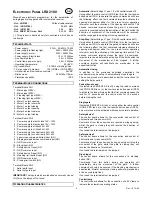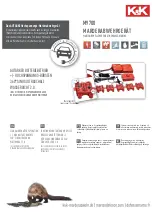
4
Rev. 1.3 12/04
E
LECTRONIC
P
ANEL
LRX
2100
Mono-phase electronic programmer, for the automation of
swinging and rolling gates with incorporated receiver.
- Mod.
LG 2100
:
Without radio receiver
- Mod.
(
LRQ 2100 )
:
30,875 MHz
- Mod.
(
LR 2100 )
:
306
MHz
- Mod.
LRS 2100
: Narrow Band
433,92
MHz
( )
This product is destined only for countries in which its use
is allowed
T
ECHNICAL
D
ATA
−
Power supply:
230V~ 50-60Hz 12,5W
−
Power supply to flashing light:
230V~ 500W Max
−
Power supply, motor:
230V~ 500W Max
−
Power supply, Electric lock:
12V~ 12W Max
−
Aux. Power output:
24V~ 5W Max
−
Control lamp power supply:
24V~ 4W Max
−
Operating temperature:
-20
÷
85°C
- Op. transmitters :
12-18 Bit or Rolling Code
- TX max. codes in memory:
120 (CODE or CODE PED)
−
Limit switch and low tension controls:
24VDC
−
Dimensions:
240x185x110mm
−
Protection capability:
IP55
T
ERMINAL
B
OARD
C
ONNECTIONS
Terminal Board CN1
1: Mains input 230V~
2: Mains input 230V~
3: Flashing light input 230V~
4: Flashing light input 230V~
5: Motor 1 output opening
6: Motor 1 output common
7: Motor 1 output closing
8: Motor 2 output opening
9: Motor 2 output common
10: Motor 2 output closing
Terminal Board CN2
1: Power supply to electric lock 12V~ 12W
2: Power supply to electric lock 12V~ 12W
3: Power supply to utilities 24V~ 5W
4: Power supply to utilities 24V~ 5W
5: Power supply to control lamp 24V~ 4W
6: Power supply to control lamp 24V~ 4W
7: open/close command button input (NO)
8: Single gate/pedestrian command input (NO)
9: GND common input
10: Block input (NC)
11: Safety device 1 input (NC)
12: GND common input
13: Safety device 2 input (NC)
14: Opening limit switch input (NC)
15: GND common input
16: Closing limit switch (NC)
Terminal Board CN3
1. Aerial earth input
2. Aerial hot pole input
IMPORTANT:
The inputs which are labelled as normally closed
(NC) must be jumped if not used.
O
PERATING
C
HARACTERISTICS
Automatic
(Select bridge J1 pos. 1 -2 with central turned off)
Using either the radio control (CODE led lit) or the low tension
button panel (PUL) to operate the gates, commands will have
the following effect: the first command impulse activates the
opening mechanism either for the pre-set motor operating
interval or until the activation of the opening limit switch. The
second command impulse closes the gate. If a command
impulse is received before the activation of the limit switch the
direction of movement of the mechanism will be reversed
whether engaged in opening or closing operations.
Step-Step
(Select bridge J1 pos. 2 -3 with central turned off)
Using either the radio control (CODE led lit) or the low tension
button panel (PUL) to operate the gates, commands will have
the following effect: the first command impulse activates the
opening mechanism either for the pre-set motor operating
interval or until the activation of the opening limit switch. The
second command impulse closes the gate. If a command
impulse is received before the activation of the limit switch the
movement of the mechanism will be stopped. A further
command impulse will reactivate the mechanism in the
opposite direction
Automatic closing
In addition to the previously described operations, the
mechanism may be set up to automatically close the gate.
The set-up procedure is described under the instructions for
setting the delay period.
Pedestrian access:
If selected (led PED\ANTA S is off), using the radio command
(led CODE PED is on) or the low tension button panel (PED)
to activate the lock will mean that the first command opens the
lock for 10 seconds and the centre waits for 10 seconds
before closing the lock.
Single gate
If selected (PED/ANTA S. led on), using either the radio control
(CODE PED led on) or the low tension button panel (PED),
only motor one will be activated with respect normal operation.
Safety device 1
The control board allows for the connection and control of
photocells and tyre sens ors (NC).
Commands from these devices are ignored during opening,
whilst the gate is closing they will reverse the direction of
movement.
If not used the terminals must be jumped.
Safety device 2
The control board allows for the connection and control of
photocells and tyre sensors (NC).
Commands from these devices during opening will stop the
movement of the gate, whilst the gate is closing they will
reverse the direction of movement.
If not used the terminals must be jumped.
Block input
The control board allows for the connection of a blocking
button (NC)
Commands from this button during any operation will
immediately stop the movement of the gate. A further
command will only be executed if the blocking mechanism is
deactivated. Normal automatic closing will work, preceded by
a five second lamp flash.
If not used the terminals must be jumped
Control lamp
The control board allows for the connection of a 24V lamp to
indicate the automatic operating status:
GB
Summary of Contents for LRX 2100
Page 4: ...7 Rev 1 3 12 04 ...






















